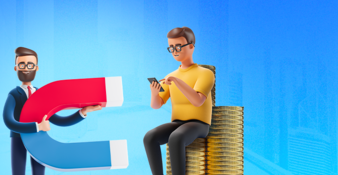Amazon's Success Code: 5 psychology tricks they use for growth

Understanding consumer psychology is a slow process. First, the whole thing seems vague and unlikely. Then you start realizing your own biases and mistakes from the past that you obviously wouldn’t make now that you know how your mind works. And then you begin noticing how others use consumer psychology tricks on you. And most of all, of course, you see the huge successful brands do these tricks.
One of those brands is Amazon. Its extreme success is hard to ignore: according to Wikipedia, it’s the largest Internet retailer in the world as measured by revenue and market capitalization, and second largest after Alibaba Group in terms of total sales. Its founder Jeff Bezos is on top of the Forbes list. Books and scientific articles have been written on the story of Amazon's success.
Obviously, obviously, dozens of factors have caused Amazon to skyrocket like this. However, make no mistake - their knowledge of behavioral psychology is one of the influential factors.
Let’s see what tricks use to get us to buy things and stay happy and satisfied with the service.
1. The power of “free”
Choosing a product on Amazon (as well as on Ebay or any other online retail store) can get tough. For example, you need an electric toothbrush. You search for one in Amazon, you find at least twenty of them in your price range. They look similar and have similar star reviews. Most likely, you spend forty minutes reading every possible online review or simply staring at the screen unable to choose.
Amazon has to offer the biggest choice of everything: it’s their maybe-not-that-unique selling point. And, as we know, a large choice can hinder the ability to make a decision. What’s the way out?
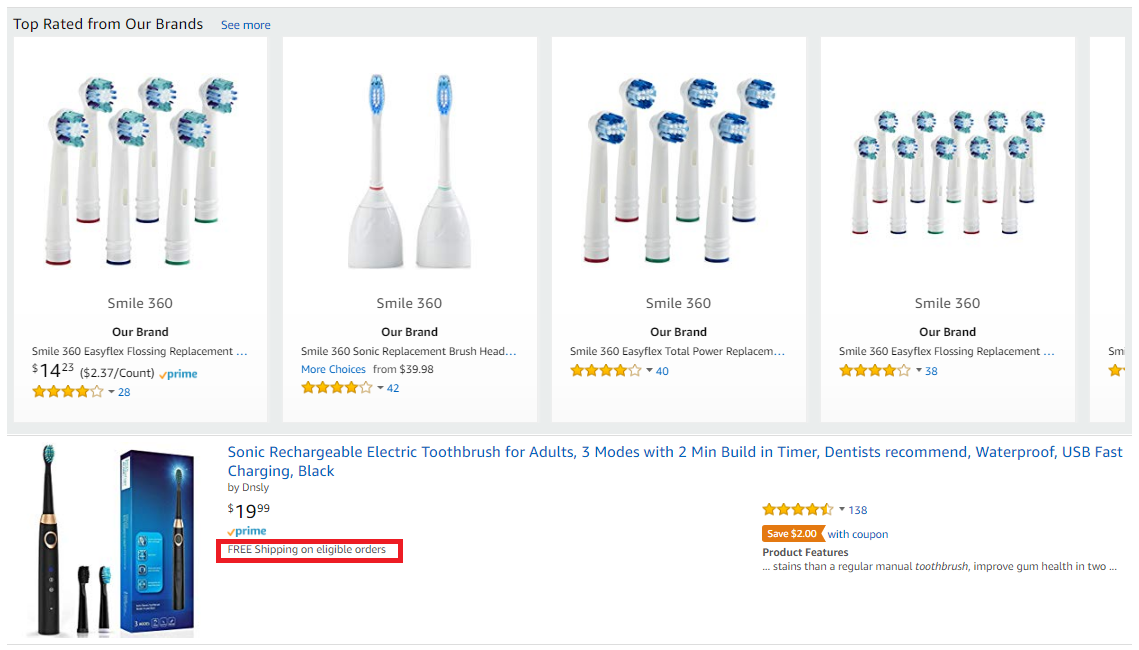
Amazon offers free delivery to one or two of the products. Of course, the delivery is not really free, it’s included in the price of the product. However, you’ll go with it and prefer the toothbrush with the free delivery despite some other flaws, such as lower quality. It will attract your attention and seem like the most optimal choice. This effect of “free” is called “the breakfast effect”: it was best shown with people preferring an unknown hotel to the one they know is good if the former offered free breakfast. A 2 euro breakfast didn’t do the trick.
Amazon Prime works in a similar way. In your head, you’re buying the service for videos, music, and other major benefits. Free product delivery is a “free” something you get from the service. Amazon Prime then must be worth the money.
2. Consistency
Let’s talk about Amazon Prime a bit more. How many of us have done the initial free trial while being completely certain that we’ll cancel it last minute, and then didn’t? I, for one, forgot to cancel, complained to my friends a lot about Amazon’s tricky policy, was told that I could just drop them an email and they’ll cancel the subscription and give me the money back… but kept using the service.
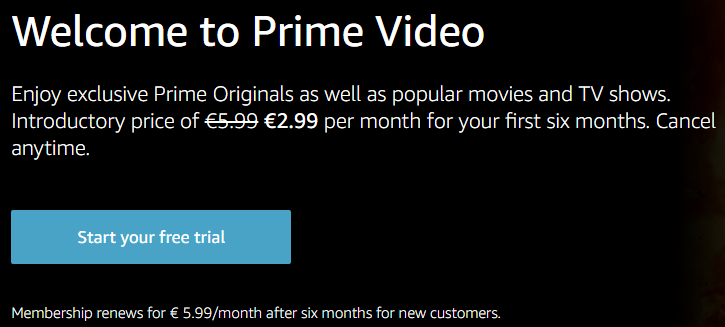
We get used to things very quickly. Once we download the Uber app and take a couple of rides, we become someone who “does that sort of thing”. The new thing becomes part of the routine.
Probably, once or twice you stopped to think that this Starbucks on your way to work is far too overpriced. That you’re not actually ready to spend that much money a year on a morning coffee or cigarettes or film access. But you’re doing that anyway, because that’s an integral part of your daily behavior, a part of who you are; because you want to be consistent with what you’ve done yesterday and the day before, even if your behavior wasn’t best for you back then.
3. Social Proof
One of the smartest things Amazon has done was to include reviews with their items. People these days don’t just buy online - they google to find reviews of the product. Amazon included reviews as a built-in feature, making the website a one-stop solution.
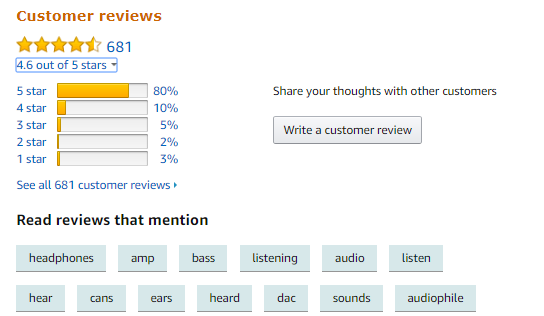
However, weirdly enough, user-friendliness isn’t what gets us to buy things as much as the psychological aspect of reviews. The social proof that reviews bring with it drives our buying behavior. Looking at them - even just seeing that reviews for the product exist! - we decide that the product is a good one since people use it, and we follow other people’s lead. Research shows that the number of reviews affects sales while the reviews themselves might not.
4. Anchoring
Estimating the price of anything is harder than you think. How much should one really pay for a toothbrush, a suit, a painting? There’s no way you can just guess the cost of production, determine a “fair” profit, and make an informed decision. Therefore, your brain tends to rely on other products to see what’s reasonable. This seems logical: in most cases, it’s the way to go. Problem is, our mind isn’t completely logical in doing that. Instead of taking all similar items, remembering their price, and calculating the average, it takes the price it sees first. It might not even be a price of a similar product! But the number acts as an anchor, and all other prices are judged high or low compared to this one that was noticed first.
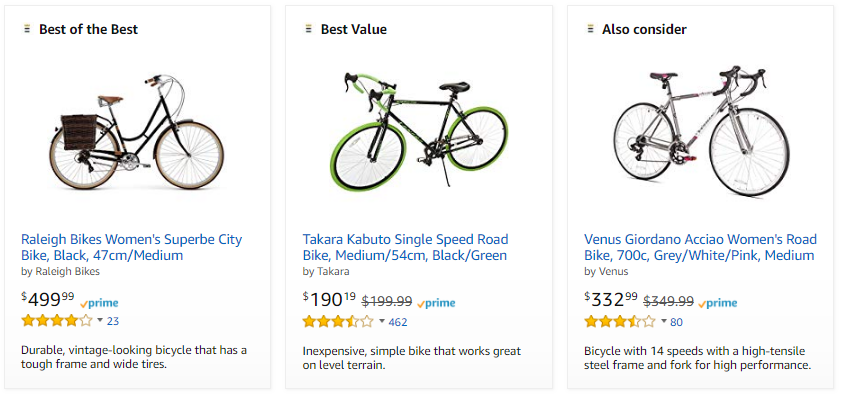
Amazon uses anchoring in their own way. They offer consistently low prices on their best-selling items while raising the prices on less popular ones. This way, it always seems that you’re getting the best possible offer.
5. Scarcity & Urgency
Most online stores will let you know when the product is out of stock. Amazon goes much further: they tell you when the product is about to be out of stock and how many are left at the moment. This way they’re creating the feeling of urgency: you’ve got to buy it and do it now, or you might never get another chance! It’s the infamous FOMO - a “fear-of-missing-out” - that is triggered by scarcity.
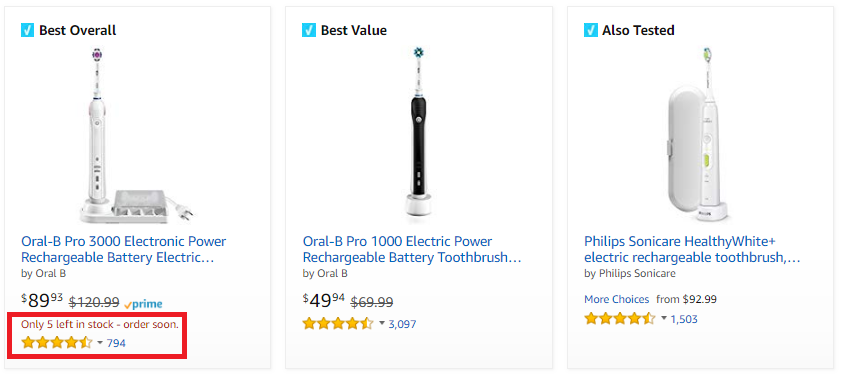
The other way Amazon creates the feeling of urgency is by introducing lines such as “Want it tomorrow? Order within 5 hrs and 2 min and choose one-day-shipping at checkout.” It makes you think that you need to act as soon as possible as time is running through your fingers and you might not survive without that multicooker for another two days.
Knowing this probably won’t stop you from using Amazon: after all, it’s also one of the most innovative companies that delivers great results and customer service. However, these is something that might be applied in your own marketing strategy or just make you more aware of how consumer psychology can be applied.
Do you have any questions or comments? Do you know something about other brands that other users might not? Let me know in the comment section below :)












